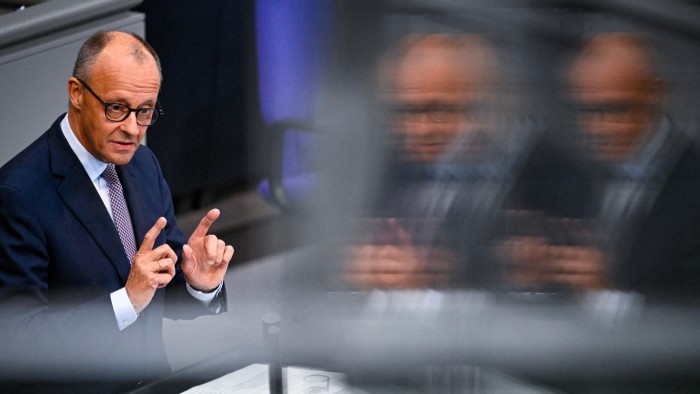Stay informed with free updates
Simply sign up to the War in Ukraine myFT Digest — delivered directly to your inbox.
German chancellor Friedrich Merz has called on the EU to use frozen Russian assets to finance Ukraine’s war effort, arguing the move could unlock a €140bn loan for Kyiv and show “staying power” against Russian aggression.
In a stark reversal of Berlin’s previous scepticism about tapping seized Russian assets, Merz said the loan should be used to fund military equipment, with EU governments deciding on procurement alongside Kyiv.
The appeal from the leader of Europe’s largest economy and Ukraine’s biggest backer comes as the European Commission examines options to leverage the €194bn worth of Russian assets held at Euroclear, Belgium’s central security depository.
Writing in the Financial Times, Merz insisted the bloc must find a legal mechanism to use the assets, saying it was imperative to “systematically and massively raise the costs of Russia’s aggression”.
EU governments, including Germany, have long resisted confiscating the assets, citing financial and legal risks and expressing concern that such a move could undermine confidence in the euro as a reserve currency and spark military escalation from Russia.
But with Donald Trump reducing US support for Kyiv and refusing to sign off on fresh sanctions against Moscow, pressure is mounting to use the frozen assets.
Merz said that the EU could make available an interest-free loan of almost €140bn “without intervening in property rights”, adding: “That loan would only be repaid once Russia has compensated Ukraine for the damage it has caused during this war.”
“Now I am advocating the mobilisation of financial resources on a scale that will secure Ukraine’s military resilience for several years,” he wrote.
Merz stressed that the funds should be directed exclusively for the purchase of military equipment, not to cover Ukraine’s general budget.
“Such a comprehensive programme must also help to strengthen and expand the European defence industry,” he wrote. “That would serve both our collective security and European sovereignty.”
Under Merz’s proposal, the loan would first be guaranteed by member states before being collateralised using money from the EU’s next long-term budget in 2028. The mechanism should, he argued, be agreed by a “large majority” of member states, suggesting he favoured a structure that could not be vetoed by opponents of the move, such as Hungary.
“Now is the moment to apply an effective lever that will disrupt the Russian president’s cynical game of buying time and bring him to the negotiating table,” Merz said.

